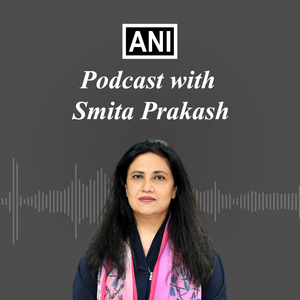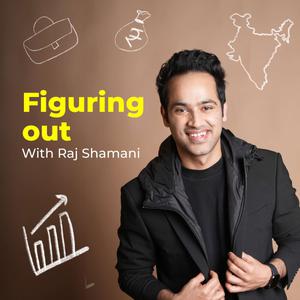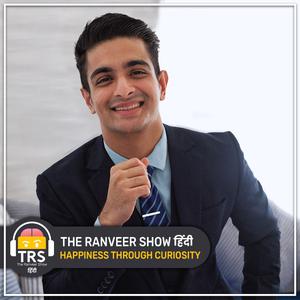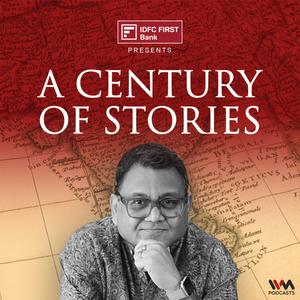
ANI Podcast with Smita Prakash
Asian News International (ANI)
- 1 hour 36 minutesEP-254 | "Arvind Kejriwal is Useless, a Megalomaniac..." Sandeep Dikshit Takes on Former Delhi CM
In the last two Delhi Assembly elections, Congress failed to secure a single seat out of 70. Its vote share has dropped from 40% to just 4% in the last 18 years. Can the Grand Old Party make a comeback in the 2025 Delhi Assembly elections? Can it rejuvenate its cadre in the National Capital? Was it a mistake to support AAP in 2013?
In this ANI Podcast with Smita Prakash, Sandeep Dikshit, Former MP and son of Ex-Delhi CM Sheila Dikshit, answers these pressing questions. He also shares untold stories about Arvind Kejriwal from the India Against Corruption movement in 2011. Sandeep Dikshit is contesting the Assembly elections against Kejriwal from New Delhi, dedicating his campaign to his late mother, whom Kejriwal had called corrupt. Dikshit does not hold back, calling Kejriwal a megalomaniac.
He also addresses key issues like traffic, Yamuna pollution, air pollution, and the need for clean water in Delhi. He discusses the India Alliance, explaining its current position and why its partners are not backing Congress in the Assembly polls. Dikshit predicts that Congress will secure a double-digit vote share in this election and that it won’t be a cakewalk for Arvind Kejriwal.
00:00 – Introduction
01:06 – Kejriwal vs. Sandeep Dikshit
11:22 – Kejriwal's Attack on Sheila Dikshit
17:48 – How Congress Lost the 2013 Delhi Polls
26:01 – Is Kejriwal Losing?
33:23 – How Delhi Votes
40:20 – INDIA Alliance 'Backs' AAP
46:52 – Congress' Delhi Nyay Yatra
50:16 – What's Wrong with Delhi Congress?
56:46 – Congress’ CM Face in Delhi
1:07:04 – ‘Megalomaniac Arvind Kejriwal’
1:15:12 – 'Sheesh Mahal' Controversy
1:22:17 – Will CAG Reports Impact Delhi Polls?
1:29:11 – The Role of the Opposition in Delhi
16 January 2025, 1:00 pm - 1 hour 3 minutesEP-253 | Delhi Polls, Freebies, Kejriwal, 'Fake' Voters & Sheesh Mahal vs Raj Mahal | Parvesh Verma
Can the BJP break the 27-year jinx and form a government in the National Capital? Who has the edge in the 2025 Delhi Assembly polls? Where does the BJP stand in Delhi? Is RSS backing the BJP in the Delhi polls? Are freebies the route to power? Who is BJP’s main rival in Delhi—Congress or AAP?
In this episode of the ANI Podcast with Smita Prakash, Parvesh Verma, former MP, answers all these questions. He is the BJP's candidate from New Delhi, contesting against Arvind Kejriwal and Sandeep Dikshit. Parvesh claims that the Aam Aadmi Party is riddled with corruption and has done nothing for the people of Delhi. He also discusses voter list manipulation charges and vote-buying allegations against him by the AAP.
Parvesh Verma also shares the story when Rahul Gandhi offered him to join Congress and contest elections. He also discusses the Sheesh Mahal vs. Raj Mahal row and BJP’s CM face for Delhi Polls. Listen in for more on nepotism in the BJP and why Jat voters matter in Delhi.
00:00 – Introduction
01:50 – Kejriwal vs. Parvesh
07:56 – Voter List Manipulation Charge
15:26 – Why Jat Votes Matter in Delhi
19:04 – CAG Report on Delhi's Scrapped Excise Policy
24:07 – Sheesh Mahal vs. Raj Mahal
29:38 – BJP’s CM Face for Delhi Polls
32:41 – Bidhuri’s Controversial Remarks
34:20 – War Over 'Fake' Voters in Delhi
41:02 – BJP's Strategy in Delhi Polls
44:59 – Vote-Buying Allegations
49:29 – Third Party’s Role in Delhi Polls
56:58 – Nepotism in BJP and Other Parties
58:29 – RSS Factor for BJP in Elections
14 January 2025, 12:30 pm - 2 hours 3 minutesEP-252 |Justin Trudeau’s love for Khalistan & his resignation| The Canadian POV with Kushal & Daniel
Why did Justin Trudeau resign? Is it a temporary tactic? What are Trudeau's scandals? Did Khalistanis prop up his government? What’s the impact on Canada after Trump won the election? To answer these questions, we are joined by Kushal Mehra, author and podcaster, and Daniel Bordman, senior correspondent for The National Telegraph and Geopolitical Analyst. In this episode of the ANI Podcast with Smita Prakash, Kushal Mehra and Daniel Bordman discuss a range of topics, including who could succeed Justin Trudeau as the Liberal Party leader and the impact of Trudeau's immigration policies on Indian students. They also discussed Trump's influence on Canadian policies, Canadian trade relations with the USA, and the recent attacks on Hindu temples in Canada. Don’t miss this episode to learn about these critical geopolitical issues and the India-Canada row.
00:00 – Introduction
01:00 – Foreign interference in Canadian politics
11:56 – Trudeau's leadership and media Influence
21:16 – Who could succeed Trudeau as Liberal Party leader?
32:22 – Impact of Trudeau's immigration policies on Indian students
42:35 – Trudeau's approach to Khalistan movement
53:22 – Trump's influence on Canadian policies
1:02:43 – Canadian trade relations with the USA
1:15:57 – Attacks on Hindu temple in Canada
1:23:37 – Backlash against Khalistani supporters in Canada
1:33:04 – Indian media's coverage and Canada's fear of foreign media
1:43:26 – Canadian 'Honk Honk' rhetoric
1:51:49 – Canada's view on Modi: A threat or a global leader?
12 January 2025, 1:53 pm - 1 hour 17 minutesEP-251 | How Temples Can Power India's Economy | Trump's Vision For USA | Sriram Balasubramanian
What is Dharmic Capitalism? How can Dharma power India’s economy? What role do temples play in the modern economy? How has Dharma shaped India’s economy over the centuries? And how did Kautilya use Dharma to boost the economy and ensure political stability?
Sriram Balasubramanian, an economist and author, explores these questions in the latest episode of the ANI Podcast with Smita Prakash. Discussing his latest book, 'Dharmanomics: An Indigenous and Sustainable Economic Model', Sriram explains how India's economic frameworks once left the world in awe.
This is his second book, following 'Kautilyanomics', which examined how Kautilya, also known as Chanakya's ideas have found resonance in today's world. Sriram also discusses the critical role of wealth creators in society. Based in the USA, Sriram also shares his thoughts on Donald Trump’s economic vision for America and his plans to steer the country’s financial future.
00:00 - Introduction
01:20 - Dharmanomics and Dharmic Capitalism
08:33 - How Governance and Economics are Linked
16:12 - Indian Influence on Southeast Asia
28:03 - Ayodhya Temple Land Acquisition
31:03 - Chola Empire Laborers and Temple Inscriptions Explained
41:00 - Role of Wealth Creators
56:14 - Trump's Economic Policies
59:24 - Working Class and a Billionaire President
01:01:53 - Inflation in the USA
01:05:49 - Why Kamala Harris Lost
01:08:49 - US-China Row
01:11:05 - Xi's Expansion Plans
01:13:09 - Musk's Doge
8 January 2025, 1:40 pm - 1 hour 46 minutesEP-250 | Untold Tales of Kargil & Balakot | Stunning Revelations on UFOs | Air Marshal Dilip Patnaik
Do UFOs exist, or are they just illusions? What’s the truth behind sightings in New Jersey and California? Is the USA hiding something? And why is there no big UFO culture in India? Has the Indian Air Force ever encountered a UFO?
In this latest episode of ANI Podcast with Smita Prakash, Air Marshal Dilip Kumar Patnaik (Retd.), former Eastern Air Commander, answers all these intriguing questions.
He also shares untold stories from the Kargil War, including flying some of the deadliest missions and dropping over two dozen bombs on enemy positions. Air Marshal Patnaik provides a glimpse into the behind-the-scenes action of the Balakot airstrikes, revealing the message the Indian government intended to send to Pakistan.
Additionally, he discusses the future of drone warfare and how it could become a game-changer in modern conflicts. Wrapping up, he explains his decision to join the BJP and what he hopes to achieve in his new role.
00:00 - Coming Up
01:33 - Introduction
02:14 - Mysterious Sightings in the USA
07:24 - Indian Mythology & UFO Culture
10:03 - Indian Air Force's Role in the Kargil War
16:38 - 'Game Changer' Mirage in the Kargil War
26:25 - Attack on Muntho Dhalo
34:32 - Experience of Air Strikes in the Kargil War
36:58 - Battle Scars
38:24 - Balakot Operation
41:13 - Pincer Attack Explained
46:47 - Pre-War Pilot Instructions
49:16 - Cat's Paw in the Air Force Explained
53:00 - How Abhinandan Varthaman Was Captured
58:19 - Return of Abhinandan to India
01:03:51 - Indian Air Force vs Pak Air Force vs China's Air Force
01:10:58 - 'IAF Requires More Aircraft'
01:17:00 - Drone Attacks in Kazan, Russia
01:21:18 - India's Aging Aircraft
01:23:37 - Bangladesh Crisis
01:28:53 - Challenges for Border Security
01:36:28 - Bangladesh Crisis: Third Front War for India?
01:38:43 - How Pakistan Sees the Bangladesh Crisis
01:40:15- Joining BJP
5 January 2025, 1:10 pm - 2 hours 8 minutesEP-249 | The Ideas Politburo with Shehzad, Kushal & Vinamre | 2024 Year-Ender Special
From politics to dating, cricket to OTT shows, the ANI Podcast Team wraps up 2024 with a year-end special that's both entertaining and insightful. Every topic is seasoned with a pinch of wit and a dash of intrigue, making it a must-listen!
In this special edition, hosted by Smita Prakash, the guests bring their unique perspectives to the table:
Shehzad Poonawalla, National Spokesperson of the BJP, shares his take on the political highlights of the year.
Kushal Mehra, an author and podcaster, weighs in on cultural shifts, Foreign Policy, and more.
Vinamre Kasanaa, popularly known as Dostcast, dives into the world of content creation, podcasting in India, and dating culture.
Together, they unpack a wide range of topics, offering sharp insights and plenty of laughs along the way. Whether you're a news junkie or just here for the banter, this episode has something for everyone!
00:00 - Introduction
03:13 - How Content Creation Has Evolved
08:15 - Podcasting in India
17:09 - When Views Drop on Podcasts
22:17 - Modi: The Best PM India Has Ever Had?
25:40 - Should India Legalize Same-Sex Marriage?
28:21 - Has India's Foreign Policy Improved Under the BJP?
32:23 - Is Free Speech Under Threat in India?
40:57 - Has India's Social Fabric Been Ruined in the Last 10 Years?
48:07 - Hindu Rashtra
51:03 - Caste-Based Reservation
55:58 - Best Daily Soap Serial and Why
57:36 - Marriage and Opposing Political Views
59:08 - Will You Stay Friends with Your Ex?
01:00:13 - Most Overrated Sports
01:01:21 - How Much Do You Spend on a First Date?
01:05:23 - What Makes You Proud to Be an Indian?
01:05:49 - Year 2024 in One Word
01:06:54 - Disrespecting Culture
01:10:28 - Does Religion Matter Before Entering a Relationship?
01:16:10 - Overrated Celebrity
01:17:32 - Picking India's Best Cricket Player
01:20:03 - Is It Okay to Cheat on Your Barber?
01:23:13 - Indian of the Year?
01:27:43 - Overrated Film
01:29:48 - The Kapoors Meeting PM Modi
01:37:44 - Online Trolling
01:39:21 - Favourite Podcaster
01:43:59 - Fame and Criticism
01:50:12 - Politicians and Their Attire
01:57:35 - Power Dynamics During Interviews
02:00:45 - Shehzad's 2025 Resolutions
02:02:53 - Kushal's 2025 Resolutions
02:04:08 - Vinamre's 2025 Resolutions
02:06:47 - Smita's 2025 Resolutions
31 December 2024, 8:35 am - 1 hour 28 minutesEP-248 | Atul Subhash Case, Gender Bias in Indian Laws & Men's Rights | Abhijit, Anil, Priya
The suicide of Bengaluru techie Atul Subhash has brought the spotlight onto gender-biased laws in India. Why did suicide become the only option for Atul Subhash? Who is responsible for his death— the system, the judiciary, or the police? His tragic death has sparked a demand for gender-neutral laws in India.
In an episode of the ANI Podcast with Smita Prakash, Priya Jain, a lawyer and co-founder of Finology Legal, discusses the legal challenges and how some sections of the law are not gender-neutral.
Anil Murty, co-founder of the Save Indian Family Foundation, points out that Atul Subhash is not an isolated case. There are many others who face similar outcomes, highlighting a larger problem in India.
Abhijit Iyer Mitra, senior fellow at the Institute of Peace & Conflict Studies, shares his perspective on how these laws are shaping India’s story.
00:00 - Introduction
02:01 - The Atul Subhash Case
08:52 - Men's Rights and Media Trials
16:31 - What Led Atul to Die by Suicide?
24:46 - Who Is Responsible for Atul's Death?
27:02 - Section 498A and Its Misuse
31:59 - The Indian Judiciary and Judges
34:51 - Marriage as an Institution
39:32 - Prenuptial Agreements Before Marriage
41:57 - Forced Marriages in Bihar
44:50 - UP Officer Booked for Exploiting IIT Kanpur Student
46:16 - The Police's Role in Forced Marriages
50:21 - The Role of Marriage Mediators in Settling Divorce Disputes
54:27 - The Need for Gender-Neutral Laws
58:43 - Kids' Role in Divorce Settlements
01:01:26 - Understanding Perjury in Divorce Cases
01:06:37 - Karnataka's Progressive Judgments
01:08:41 - Legal Pros and Cons of Marriage
01:13:32 - Gay Relationships
01:16:34 - The Role of Save Indian Family Foundation
01:22:46 - Arnesh Kumar v. State of Bihar
01:24:37 - Prenuptial Agreements
27 December 2024, 1:00 pm - 1 hour 28 minutesEP-247 | Mandir-Masjid Debate: Places of Worship Act & India's Constitution | J. Sai Deepak
There seems to be no end to the Temple-Mosque disputes in India. After Ayodhya, claims have emerged regarding a mosque allegedly being built after the demolition of a temple in U.P.'s Sambhal. What does the Places of Worship Act, 1991, say about such disputes? Did the Ayodhya judgment set a legal precedent? And what about maintaining communal harmony?
In the latest episode of the ANI Podcast with Smita Prakash, J. Sai Deepak, a Senior Advocate at the Supreme Court of India and the Delhi High Court, delves into several pressing issues. He shares his insights on Tamil Nadu's political landscape, the broader dynamics of Indian politics, and Prime Minister Narendra Modi's advocacy for the 'Secular Civil Code'.
Additionally, he sheds light on the challenges faced by the Hindu community in Bangladesh and discusses the implications of these issues on India's socio-political fabric.
00:00 - Introduction
01:56 - Sambhal Mosque Row
06:58 - Conversion of Worship Sites
15:58 - Pending Cases in Mosque-Temple Disputes
19:32 - The Places of Worship Act, 1991
22:37 - Ganga-Jamuni Tehzeeb
26:11 - Historians and Temple-Mosque Disputes
30:49 - Justice R.F. Nariman on Ayodhya Verdict
33:48 - How Many Temples Were Destroyed
36:51 - Attacks on Hindus in Bangladesh
47:06 - Snap Reaction on Asaduddin Owaisi
49:31 - Snap Reaction on D.Y. Chandrachud
52:26 - Snap Reaction on K. Annamalai
56:43 - Snap Reaction on PM Narendra Modi
01:03:07 - Snap Reaction on Omar Abdullah
01:05:30 - Snap Reaction on Rahul Gandhi
01:10:11 - Snap Reaction on Udayanidhi Stalin
01:11:11 - Thalapathy Vijay in Tamil Nadu's Politics
01:15:21 - Social Media Fan Following
01:16:40 - J. Sai Deepak's 3rd Book
01:18:26 - Senior Advocates and Junior Advocates in Court
01:21:22 - Nepotism in the Judiciary
01:25:06 - PM's Push for 'Secular Civil Code'
22 December 2024, 1:00 pm - 1 hour 42 minutesEP-246 | Mental Health Crisis, Stress at Work, Anxiety, Depression & Types of ADHD | Dr Achal Bhagat
Why are mental health disorder cases rising in India? Why are so many young people struggling with depression and anxiety? What are the real causes of ADHD, and how can we break common myths about mental health?
To answer these questions, we are joined by Dr. Achal Bhagat, one of New Delhi’s leading psychiatrists. He is a Senior Consultant Psychiatrist and leads a team of psychologists, social workers, and therapists.
In this episode of the ANI Podcast with Smita Prakash, Dr Bhagat talks about India’s mental health crisis, including stress at work, relationship struggles, and rising divorce rates. He also explains why children and teenagers are more affected by depression and how society often misunderstands mental health.
Don’t miss this episode to learn how to manage stress, anxiety, and depression, and how to seek help from professionals.
Audio Timestamps:
00:00 - Introduction
00:48 - Psychiatrist vs. Psychologist vs. Therapist
09:07 - Violence Against Women
12:15 - Depression Among Women
14:05 - Mental Health Stigma
17:21 - Mental Health Myths
22:38 - Time to Discuss Mental Health
23:12 - Suicide Cases in Kota
27:00 - Parental and School Pressure
28:44 - How Psychiatrists Handle Suicidal Thoughts
33:42 - Loneliness Among the Ageing Population
40:22 - Social Media Addiction
43:10 - Work-Life Pressure
50:22 - Managing Relationship Pressures
54:12 - Increasing Divorce Rates in India
58:00 - Alcohol and Smoking
01:00:09 - Pollution and Mental Health
01:02:38 - Depression and Anxiety
01:04:15 - Mental Illness: Diagnosis and Treatment
01:08:21 - Genetics and Mental Health Disorders
01:11:22 - Helping Someone in Mental Distress
01:30:10 - Mental Health Terms to Avoid
01:34:00 - Parenting for Boys and Girls
01:37:28 - Relationship Between Patients and Psychiatrists
18 December 2024, 1:55 pm - 1 hour 13 minutesEP-245 | The Dark Side of the Modelling World: Backstage Chaos, Surgeries, & Struggles | Alicia Kaur
What does it take to become a supermodel? How difficult is it to reach the top of the modelling industry? What role do diet and body image play in modelling? Why is there a rise in cosmetic surgeries among models and actors? What goes on behind the scenes during a fashion show?
To answer these questions, we're joined by Alicia Kaur, a Mumbai-based model originally from Australia, who has made a name for herself in the fashion industry.
In this ANI Podcast with Smita Prakash, Alicia talks about the challenges she faced in the modelling world and why discipline is key to success. She also shares her struggles while working in China and discusses the roles of designers, choreographers, and models in fashion events.
Alicia opens up about a viral skit she did with actor Sidharth Malhotra, which led to a lot of criticism. She also speaks about her decision to undergo breast surgery and why some models feel the need to enhance their facial features. Plus, she shares her experience of working with Shah Rukh Khan on an ad campaign.
Don't miss this episode to learn what it takes to be a supermodel.
00:00 - Introduction
00:38 - Modeling: A Childhood Dream
08:08 - Work Experience in China
15:08 - Struggling Due to Passport Theft in Hong Kong
17:52 - Journey to Becoming a Supermodel & Touring India
21:08 - Sidharth Malhotra & Alicia's Viral Video
23:58 - Role of Designers, Choreographers, and Models in Fashion Events
25:55 - What Happens Backstage During Fashion Shows
28:35 - Choosing Veganism
35:01 - Cosmetic Surgery Among Models
39:16 - The Reason for Undergoing Breast Surgery
42:06 - Celebrities Trolled for Botox
45:23 - Facing Acceptance Issues
48:16 - Favorite Designers
50:18 - Drug Issues in the Modeling Industry
51:38 - Is Modeling a Gateway to Bollywood?
52:41 - Working Experience with Shah Rukh Khan
55:53 - First Ad Shoot in India
57:36 - Addressing Skin Color Diversity in Modeling
01:02:58 - Advice for Aspiring Models
01:07:53 - Favorite Indian Food
15 December 2024, 1:26 pm - 2 hours 16 minutesEP-244 | 'Religious Genocide,' Temple Destruction, Forced Conversions: Tipu Sultan's legacy | Vikram Sampath
Tipu Sultan, the ruler of Mysore from 1782 to 1799, is often celebrated in history books as a freedom fighter and the "Tiger of Mysore." He was the son of Hyder Ali, a Muslim military officer who became the king of Mysore after overthrowing the Hindu Wadiyar dynasty. But was Tipu Sultan truly a freedom fighter, or was he an Islamist ruler known for his tyranny?
In his latest book, 'Tipu Sultan: The Saga of Mysore's Interregnum (1760–1799)', historian and author Dr. Vikram Sampath challenges the popular narratives about Tipu Sultan. Drawing on detailed research, Dr. Sampath explains Tipu’s actions against Hindus and Christians, including the destruction of temples, forced conversion to Islam, and what he describes as "religious genocide."
Dr Sampath, known for his two-volume biography of V.D. Savarkar and other notable works, discusses these controversial aspects of Tipu Sultan’s rule in this episode of the ANI Podcast with Smita Prakash.
He also criticizes political parties for celebrating Tipu Jayanti, arguing that Tipu’s legacy includes the torture and slaughter of thousands of Hindus and Christians and that he should be remembered for these actions, not glorified.
Tune in to this episode to uncover the true history of Tipu Sultan and understand why he remains a figure of admiration in Pakistan and among its politicians.
00:00 - Introduction
02:10 - Why write a book on Tipu Sultan?
06:55 - Fire at the 'Sword of Tipu Sultan' set, 1989
09:50 - How did Vikram Learn Kannada
17:40 - Article on Mysore Dewans
22:21 - How long did the book research take?
29:45 - On Tipu Sultan's father, Hyder Ali
37:55 - How Hyder Ali overthrew the Wadiyars
48:05 - Tipu Sultan’s mother
56:35 - Naraka Chaturdashi Story
01:09:10 - Hyder Ali, a 'womanizer'
01:19:20 - Mass circumcision of 85,000 Kodavas (Coorgis)
01:25:30 - Was Tipu Sultan a freedom fighter?
01:34:10 - The first decade of Tipu's rule
01:45:40 - Shankaracharya's trick to save the Math
01:54:50 - The surrender of Tipu Sultan’s two sons
02:03:28 - The cannons of Tipu Sultan
02:08:20 - The reason behind writing the 984-page book
02:11:30 - Black magic
12 December 2024, 1:50 pm - More Episodes? Get the App
Your feedback is valuable to us. Should you encounter any bugs, glitches, lack of functionality or other problems, please email us on [email protected] or join Moon.FM Telegram Group where you can talk directly to the dev team who are happy to answer any queries.
 ThePrint
ThePrint
 In Focus by The Hindu
In Focus by The Hindu
 Raj Shamani's Figuring Out
Raj Shamani's Figuring Out
 The Ranveer Show हिंदी
The Ranveer Show हिंदी
 The Morning Brief
The Morning Brief
 A Century Of Stories
A Century Of Stories